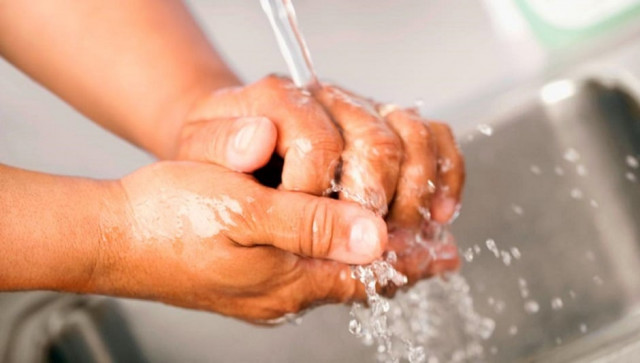Better handwashing practices can cut disease burden
Experts point to breaking taboos surrounding women’s hygiene, educating younger generation

PHOTO: REUTERS
They were speaking at a seminar on Monday titled “Global Handwashing Day 2019: Clean Hands for All” organised by the Sustainable Development Policy Institute (SDPI) in collaboration with the Ministry of Climate Change Pakistan in Islamabad.
UNICEF Pakistan’s Chief of WASH Tewodros Mulugeta said that the ‘Clean Green Pakistan’ initiative — a flagship programme of the government —offers the right direction, policy and guideline for better Water, Hygiene and Sanitation (WASH) facilities in the country.
He suggested Clean Green Pakistan consider WASH as a fifth important pillar of the initiative.
Global Handwashing Day: Soap use termed best deterrent to infectious diseases
“With strong partnership under Clean Green Pakistan programme, we all can achieve our desired objectives of WASH,” Mulugeta added.
Water Supply and Sanitation Collaborative Council (WSSCC) Pakistan Country Head Tanya Khan said that clean water, sanitation and hygiene are our fundamental human rights as per the Constitution.
She said that citizens must hold the responsibility to account for the provision of better WASH facilities.
“Inter-sectoral approach through coordination and collaboration among civil society, corporate sector, academia, media and government institutions is required for enhanced delivery in WASH sector,” she stressed.
Talking about hygiene among women is considered a taboo in our society, Tanya lamented, adding that these taboos need to be broken by educating the young generation at the school level and also educating parents through social mobilisation at the grassroots level. SDPI Executive Director Dr Abid Qaiyum Suleri said malnourishment and stunting is a major challenge for our society and if this marginalized segment of the society does not observe the best handwashing practices, they will become even more vulnerable.
“There is a need for addressing inequalities in access to handwashing, hygiene and sanitation facilities to help reduce the risk of the vulnerable groups to diseases,” he stressed, adding that social protection policies and measures should also incorporate handwashing, hygiene and sanitation components for better and improved health indicators.
Washing hands prevents diarrhoea
“This year’s theme [for Global Handwashing Day] is ‘Clean hands for all’. The theme focuses on the importance of handwashing equity and follows the push to leave no one behind in the Sustainable Development Agenda,” said Maryam Shabbir, an environmentalist at SDPI.
She added that there is a need to address inequalities in access to handwashing facilities and programs to reduce the risk of the marginalized groups to diseases that impact their health, education and economic outcomes.
Published in The Express Tribune, October 15th, 2019.



















COMMENTS
Comments are moderated and generally will be posted if they are on-topic and not abusive.
For more information, please see our Comments FAQ